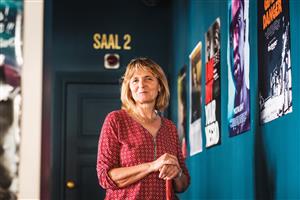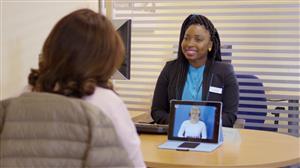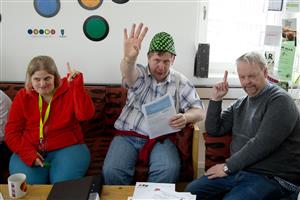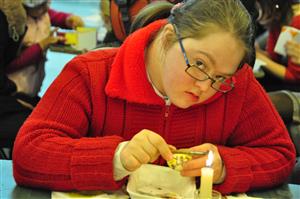Search Results
Search
Filter results
Advanced Filters
Your search returned 314 Solutions
-
Online job-platform used by more than 10,000 jobseekers with disabilities
Engelsizkariyer.com is the first Turkish career portal for people with disabilities. Jobseekers can obtain free membership and apply for free trainings(via e-learning). The organization also offers services to companies and has created a reference book on communication with Disabled for HR personnel and community.
Engelsizkariyer, Disabled Human Resources and Career Web (Barrier Free Careers), Turkey -
Acceo offers telephone services to enable conversations between persons with hearing impairments and hearing persons. Registered companies can provide a new dimension in customer service by enabling communication with the hearing impaired.
Acceo enables phone conversations between persons with hearing impairments and hearing persons. Via a internet connection, real-time video interpretation in Sign Language and Instant Transcript Word can be offered. The service is free of charge for the user, companies offering this service cover the cost.
Delta Process, Service provider for accessible phone calls, France -

Mobile App Providing Captioning and Audio Description in Cinemas
Film distributors provide Greta & Starks with an audio description and subtitles for films that are showing in cinemas and the company uploads these to the free GRETA app, which people can then use in cinemas without needing special equipment. Over 30,000 people used the app between 2014 and 2018, and 80 to 100 films are added each year.
Greta & Starks Apps, GRETA App, Germany -

Video sign language interpretation for bank customers
The SignVideo app enables Barclays Bank staff to connect to a interpreter giving them and customers who are deaf or hard of hearing the possibility to speak with each other without actually having an interpreter physically present. In the year 2016, the service was available in all Barclays Bank branches in the UK.
Barclays Bank, United Kingdom -
The open-source software 'Universal Maths Conversion Library' (UMCL) was developed into a web-based tool to convert all kinds of documents containing mathematical formulae into Braille.
MathInBraille improved the open source software "Universal Maths Conversion Library" and developed a web portal. This means the tool can be used online without users having to install specific software. With the web-based convertion tool the user can convert different document formats into accessible versions.
Hilfsgemeinschaft - Austrian Association supporting the Blind and Visually Impaired, Web-portal to convert math formulae into Braille, Austria -
ITU standard on indoor audio navigation system for the blind
Wayfindr is the world’s first internationally-recognised standard for accessible audio navigation. It was approved in March 2017 by the ITU and gives governments, companies, and NGOs around the world an accepted benchmark along with a host of resources to implement the technology in their own organizations.
ITU - International Telecommunication Union, Regional Presence Europe, Global – International Telecommunication Union – International standard for indoor audio navigation, United Kingdom -

Study circles for persons with intellectual disabilities to engage in voting
Small study circle groups learn from easy-read materials and DAISY-formatted audio texts that describe Swedish democracy and the voting process. A group leader assists by fielding questions to politicians and arranging discussions. For the 2018 election there were 109 study circles, totalling some 650 people in 80 municipalities.
SV Study Association Vuxenskolan, My choice/My election, Sweden -
Online accessibility self-check tool for companies
Barrier-Check educates and trains companies about barrier-free requirements. The site allows users to get a traceable and clear analysis of their own situation regarding accessibility by using selectable modules. Since its launch in 2015, more than 11,000 users have accessed the website more than 90,000 times.
OEZIV - Austrian Civil Invalid Association, Barrier Check, Austria -

Canadian Centre on Disability Studies: From hidden children to inclusive education
The aim of the project was to advance inclusive education in two regions in Ukraine. The project took a multi-level approach by developing civil society capacity, supporting policy development and enhancing the capacity of the school system to deliver quality education for all students, including those with disabilities.
Canadian Centre on Disability Studies, Ukraine -
Improving research and training on urban accessibility and Universal Design
The project involves publishing research on Universal Design, improving the curricula and training of planners and surveyors undertaking university study, plus assessing cities on accessibility criteria. As of 2019, two studies and one paper have been published, and four university courses have been modified.
University of Belgrade, Faculty of Architecture, Teaching Universal Design, Serbia